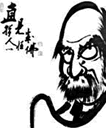Has anyone read this book before? I'm trying to read it now and finding it difficult to plow through.  I'm currently reading "The Bloodstream Sermon" trying to make heads or tails out of it.
I'm currently reading "The Bloodstream Sermon" trying to make heads or tails out of it.
Maybe it's too advanced for this beginner!
 I'm currently reading "The Bloodstream Sermon" trying to make heads or tails out of it.
I'm currently reading "The Bloodstream Sermon" trying to make heads or tails out of it.Maybe it's too advanced for this beginner!



Comment